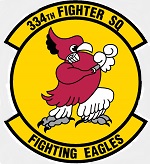Hobby Master HA8450B USAAF Republic P-47D Thunderbolt Fighter - Col. Steve Pisanos, 334th Fighter Squadron "Fighting Eagles", 4th Fighter Group, Essex, England, 1943 (1:48 Scale)
"Why should we have a navy at all? There are no enemies for it to fight except apparently the Army Air Force."
- General Carl Spaatz, Commander of the US 8th Army Air Force, after WWII
 Nicknamed the "Jug" for its bulky shape, the Republic P-47 Thunderbolt was considered a monster of a machine. Despite its size, the Thunderbolt proved to be a fast and maneuverable warbird able to hold its own in combat. In fact, when Allied pilots climbed aboard a P-47, they knew the were in control of a fighting machine with enormous power. More importantly, they knew that if their aircraft was hit but gunfire, they had an excellent chance of making it home.
Nicknamed the "Jug" for its bulky shape, the Republic P-47 Thunderbolt was considered a monster of a machine. Despite its size, the Thunderbolt proved to be a fast and maneuverable warbird able to hold its own in combat. In fact, when Allied pilots climbed aboard a P-47, they knew the were in control of a fighting machine with enormous power. More importantly, they knew that if their aircraft was hit but gunfire, they had an excellent chance of making it home.
Refinements to the Thunderbolt continued throughout its career, leading to the P-47D, which was the most produced version with 12,558 built. The "D" model actually consisted of a series of evolving production blocks, the last of which were visibly different from the first.
The first P-47Ds were actually the same as P-47Cs. Republic could not produce Thunderbolts fast enough at its Farmingdale plant on Long Island, so a new plant was built at Evansville, Indiana. The Evansville plant first built a total of 110 P-47D-1-RAs, which were completely identical to P-47C-2s. Farmingdale aircraft were identified by the -RE suffix after the block number, while Evansville aircraft were given the -RA suffix.
The P-47D-1 through P-47D-6, the P-47D-10, and the P-47D-11 successively incorporated changes such as the addition of more engine cooling flaps around the back of the cowl to reduce the engine overheating problems that had been seen in the field. Engines and engine subsystems saw refinement, (the P-47D-10 introduced the R-2800-63, replacing the R-2800-21 seen in previous P-47s) as did the fuel, oil and hydraulic systems. Additional armor protection was also added for the pilot.
The P-47D-15 was produced in response to requests by combat units for increased range. "Wet" (equipped with fuel plumbing) underwing pylons were introduced to allow a bomb or drop tank pressurized by vented exhaust air to be carried under each wing, in addition to the belly tank.
Pictured here is a 1:48 scale replica of a P-47D Thunderbolt fighter that was piloted by Col. Steve Pisanos, was was attached to the 334th Fighter Squadron "Fighting Eagles", 4th Fighter Group.
Sold Out!
Dimensions:
Wingspan: 10-inches
Length: 8-3/4-inches
Release Date: January 2015
 Historical Account: "The Flying Greek" - Steven Nicholas Pisanos (born Spiros Pisanos (November 10th, 1919 - June 6th, 2016) was a Greek-American aviator and flying ace who served as a fighter pilot with the British Royal Air Force (RAF) and later the United States Army Air Forces in World War II. He was credited with shooting down 10 enemy aircraft while flying with the American 4th Fighter Group. Post-war, he achieved the rank of colonel in the United States Air Force, flew in the Vietnam War and, by the end of his career in 1974, had received 33 decorations and distinctions. His autobiography, The Flying Greek, was published in April 2008.
Historical Account: "The Flying Greek" - Steven Nicholas Pisanos (born Spiros Pisanos (November 10th, 1919 - June 6th, 2016) was a Greek-American aviator and flying ace who served as a fighter pilot with the British Royal Air Force (RAF) and later the United States Army Air Forces in World War II. He was credited with shooting down 10 enemy aircraft while flying with the American 4th Fighter Group. Post-war, he achieved the rank of colonel in the United States Air Force, flew in the Vietnam War and, by the end of his career in 1974, had received 33 decorations and distinctions. His autobiography, The Flying Greek, was published in April 2008.


